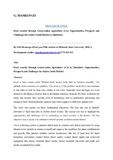Please use this identifier to cite or link to this item:
https://cris.library.msu.ac.zw//handle/11408/1318| Title: | Food security through conservation agriculture (CA) in Zimbabwe: opportunities, prospects and challenges for Gokwe South District: paper presented at a conference held on the 14th-16th July 2015, Elephant Hills Resort, Victoria Fallls, Zimbabwe | Authors: | Mashango, Gift | Keywords: | Conservation agriculture, Food Security, Sustainable Livelihoods Approach and sustainable intensification |
Issue Date: | 2016 | Publisher: | Midlands State University | Series/Report no.: | Conference Proceedings; | Abstract: | Food is basic human need. Without food, human body fails to function normally. Yet, globally food insecurity is a problem. The severity of the problem varies from one continent to the other as well as from one country to the other. Generally food shortages are more intense in developing counties than in developed countries. Reasons for these variations are many and diverse; they include level of technology used in production, processing and storage of food. Food production policies may either support or stifle food productivity. The study was centred on three fundamental objectives. The first one was to identify attributes of food insecurity in Gokwe South district. The second one was to highlight the opportunities and challenges of CA technology on food security in the district. The last objective was to assess CA attribution to food security in Gokwe South district. CA is a farming system or practice which aims to conserve soil, labour and water by using blanket cover (mulch) to minimise runoff and improve the conditions for plant establishment and growth. This practice includes various mechanisms like use of hand hoes for basin formation, jab-planter, animal drawn direct seeder, animal drawn ripper and motorised equipment like tractor mounted direct seeder, tractor mounted sub-soiler and multi row tractor mounted direct seeder. Survey results indicated that although CA contributes significantly to household food security, ‘as a best practice’ but it’s not a ‘best fit’ practice since results fluctuates from one area to the other. Introduction of CA in Zimbabwe was input driven supported mostly by non-governmental organisations hence sustainability of the concept is highly questionable. The results revealed that CA is more of a farming system than technology and its key principles are not of equal eminence and farmers are practising CA at a small scale citing labour constraints. Markets play a crucial role in attainment of sustainable food security. | Description: | Theme: 1st International Research Conference On Driving Socio-Economic Development Through Value Addition And Sustainable Use Of Resources | URI: | http://hdl.handle.net/11408/1318 |
| Appears in Collections: | Conference Papers |
Files in This Item:
| File | Description | Size | Format | |
|---|---|---|---|---|
| mashango.pdf | 909.64 kB | Adobe PDF |  View/Open |
Page view(s)
234
checked on Feb 11, 2026
Download(s)
208
checked on Feb 11, 2026
Google ScholarTM
Check
Items in MSUIR are protected by copyright, with all rights reserved, unless otherwise indicated.



